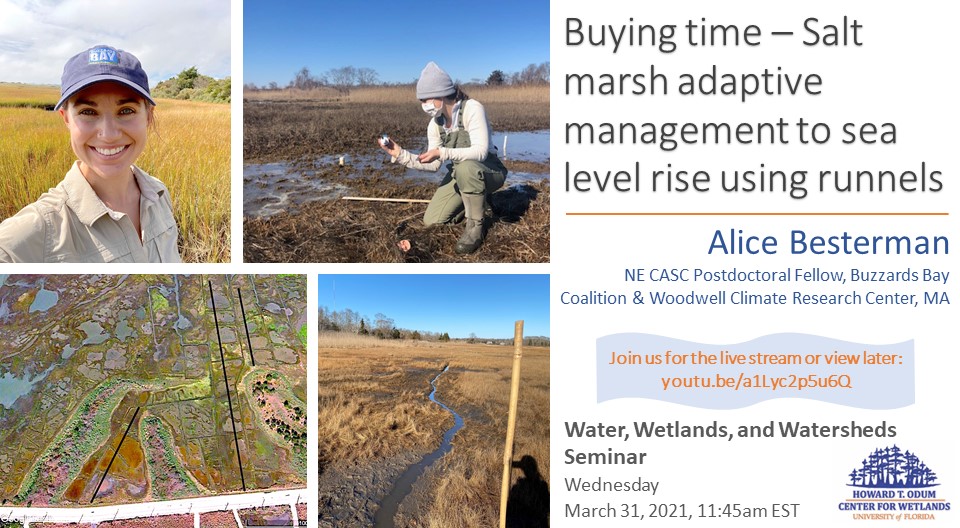March 31, 2021
Buying time – Salt marsh adaptive management to sea level rise using runnels
Alice Besterman, NE CASC Postdoctoral Fellow, Buzzards Bay Coalition & Woodwell Climate Research Center, MA
Join us for the live stream March 24, 11:45am EST: youtu.be/a1Lyc2p5u6Q
ABSTRACT
Salt marshes across the Northeast and Mid-Atlantic are experiencing rapid expansion of shallow pools, which are “eating” marshes from the inside out. Sea level rise, in interaction with numerous other drivers, has led to a net loss of marsh vegetation and shallow pool expansion. An emerging adaptation technique, runnels, which resource managers have piloted in the Northeast, attempts to slow the advance through hydrologic modification. Runnels are small channels created to tidally connect expanding shallow pools to nearby creeks or ditches, reduce impounded water, and promote revegetation. By simulating the natural “pool recovery” process, managers hope to slow or halt pool expansion, and even facilitate marsh migration. Over a decade of incremental application by restoration practitioners has shown promising outcomes, but controlled experimental studies are lacking. Our research team recently initiated an experiment to test fundamental questions on mechanism, generality, and effectiveness of runnels across a 65,000 m2 study area. In this talk, I will review the problem of shallow pool expansion, the history and theory of runnels as used in tidal marsh adaptation, and describe our large-scale experiment which is the first controlled study of runnels conducted at this scale. Rapid salt marsh loss is a “wicked problem”; runnels may offer an opportunity to buy salt marshes time while coastal communities adapt.
Bio
Dr. Alice Besterman is a Postdoctoral Fellow working with the Buzzards Bay Coalition, an environmental nonprofit, and Woodwell Climate Research Center, a scientific research organization, both based in Massachusetts. She received her bachelor’s degree from Virginia Commonwealth University in Environmental Studies and her PhD from University of Virginia in Environmental Science. Besterman is a coastal ecologist studying changes including sea level rise and invasive species, and their effects on ecosystems of conservation interest. Besterman’s PhD research assessed the distribution and effects of an invasive seaweed on intertidal mudflat communities along the Virginia coast. Her postdoctoral work is focused on northeastern tidal marsh vulnerability and climate adaptation. Along with project partners based at NGOs, state and federal agencies, and academic institutions, Besterman is focused on urgent and actionable science that will be used in coastal adaptation. Current projects are funded by EPA through the Southeast New England Program, and by USGS through the Northeast Climate Adaptation Science Center.
Seminar postcard

